#Reptile species
Explore tagged Tumblr posts
Text
10th of October 2024: Thai Forest Skink

Already a third of the way through October, damn. Anyway, here’s the Thai Forest Skink (Sphenomorphus tersus). While it wasn’t specified why they were given the name tersus, its latin translation may be referring to the “elegant” body shape of the skink [1].
For the first 85 years of their existence, they were only known to live in Thailand, however in 2001, their presence in peninsular Malaysia was thought to be confirmed based upon a single gal found among boulders next to a stream [2]. Later analyses then found a very similar skink species inhabiting this area, meaning that whether or not they are actually found there is still uncertain [3].
They can be found in many varieties of forest, such as primary and secondary dipterocarp forests [4] – dipterocarp here referring to the family of plants found there, in this case a type of often, if not always, large tropical tree [5] – as well as monsoonal evergreen forest. This combined with their habitat being rather unthreatened has meant they are considered of Least Concern in terms of conservation [4].
Sources: [1] [2, Vol. 33, pg. 149] [3] [4] [5] [Image]
#critter of the day#critteroftheday#skink#skink species#reptile#reptile species#herpetology#zoology#animal facts#animal#animal species
7 notes
·
View notes
Text




Common five-lined skink 》 Plestiodon fasciatus
Spotted this guy on the camping trip and have been seeing them around my apartment every since I got home.
Caddo Lake State Park, Texas, 3 Aug. 2024
#not a mushroom#not fungi#mushroom foraging#foraging texas#blue tailed skink#common five lined skink#skink#five lined skink#lizard#reptile identification#reptile species#species identification#special interest#goblincore#crowcore#nature trail#naturecore#caddo lake state park#lizards of texas#amatuer mycology#mushroom hunting#red rocks
4 notes
·
View notes
Text
youtube
Gharial: Nature's Fish-Eating Specialist
Discover the fascinating world of the Gharial, a unique crocodilian adapted for a life in water! Learn about its diet, behavior, and habitat.
Check out my other videos here: Animal Kingdom Animal Facts Animal Education
#Helpful Tips#Wild Wow Facts#Gharial#Crocodile species#Fish-eating crocodile#Endangered species#Indian wildlife#Wildlife conservation#River habitat#Ganges River#Reptile documentary#Nature documentary#Animal facts#Rare animals#Aquatic predators#Wildlife photography#Crocodile behavior#Gharial hunting#Gharial conservation#National parks India#Reptile species#Freshwater reptiles#Animal kingdom#Wildlife enthusiasts#Nature lovers#Indian rivers#Reptile protection#youtube#animal behavior#fun animal facts
1 note
·
View note
Text





So--long story short, a FedEx driver killed a rattlesnake that happened to be on someone's porch, not causing any immediate problems. This is an all too common practice here in the United States, where a significant portion of the population has the backwards idea that "the only good snake is a dead snake" and that the only way to deal with a venomous snake in the proximity of a house, or people in general, is to kill it. Never mind that snakes tend to move on if left alone, and that there are numerous entities that can be contacted to move the snake safely to another place if so desired, and that most bites occur when someone is harassing, handling, or trying to kill the snake.
Dr. Emily Taylor of California Polytechnic State University (@snakeymama on Twitter) has requested that people contact FedEx about their recent commercial glorifying the killing of the snake, which you can view here. I've included both her and my letters to the appropriate folks at FedEx. There are options for both email and snail mail correspondence, and the more people FedEx hears from about this appalling matter, the better.
It's 2024, almost 2025. We have tons of information on rattlesnake behavior and best practices in coexisting with them (to include training your dogs in snake avoidance). We know plenty about the importance they have in local ecosystems, and the devastation that has been done through people slaughtering them, sometimes in the thousands (I wrote about the ongoing problem of rattlesnake roundups and their inherent cruelty here.) There are multiple rattlesnake species that are endangered or otherwise threatened with extinction.
The vast majority of encounters with venomous snakes are benign, and the vast majority of bites come from someone (person, dog, etc.) confronting the snake that was just trying to defend itself. We've spent a lot of time in this country defaulting to killing anything that inconveniences us, but there are better ways to live safely in proximity to wildlife that don't involve violence. It just takes a little more effort and awareness, and most importantly a significant attitude change that no longer vilifies native wildlife simply trying to live their lives.
As Dr. Taylor mentioned, if you want to contact FedEx, here are your options:
"You can help by reposting this or by emailing to express your concern about the commercial: [email protected] and to the CEO at [email protected]. Or send letters to: Fred Smith, CEO Brie Carere, Executive Vice President and Chief Customer Officer Ryan Kelly, Vice President of Marketing FedEx Corporation 942 South Shady Grove Road Memphis, TN 38120 USA"
#animal death#cw animal death#animal cruelty#animal welfare#snakes#rattlesnakes#reptiles#herps#nature#wildlife#animals#ecology#endangered species#conservation#animal behavior#PSA#call to action#please reblog#important
3K notes
·
View notes
Text
fieldbook (mostly this year): expedition sketches. different places and seasons


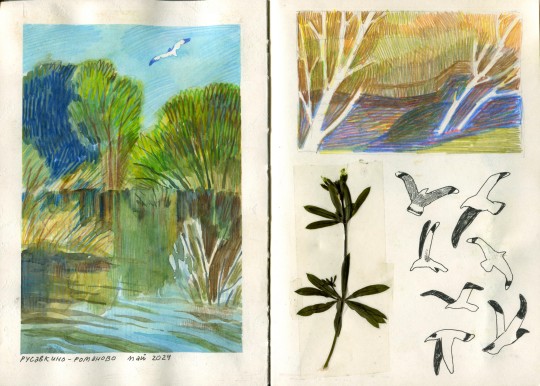



#fieldbook_barghest_land#<- new tag!!#for the field sketchbook :)#the last one is from yesterday btw!#found some tiny shiny shark teeth#and some fish bones + fish flat teeth#and a little piece of ichty bone#or some other marine reptile#hard to identify#it's a lot of them there#sadly not in a good condition to say what species it is#barghestland#traditional art#artists on tumblr#paleoland
2K notes
·
View notes
Text
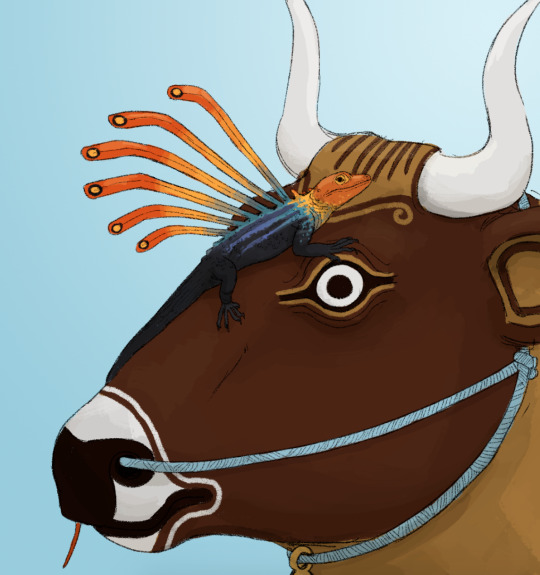
Fuck it, Longisquama analogue. Attempting to show himself off on a painted Ganmache cult statue.
#Not actually longisquama it's a squamate#I think it would be fun if Basically the same thing as one of the weirdest ancient reptiles was just out there as a completely#mundane sight. Common urban lizard#Probably part of a wider genera with most species in forest habitats and a few adapted to open grassland/scrub#creatures
353 notes
·
View notes
Text
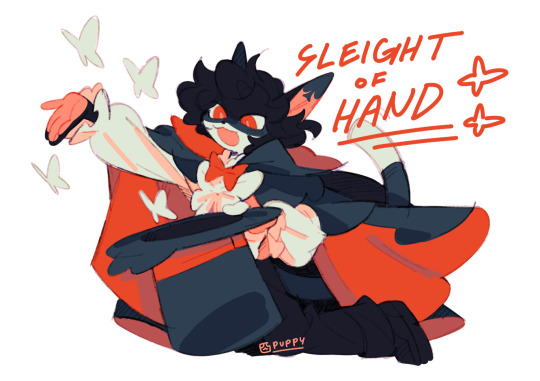

wanna see a magic trick? 🪄🎩
#YEAYYYY i like drawing this guy#now that i think abt it i cant remember the last time i saw a furry with tattoos.... ive decided not to think too hard about how it would#work but i think i like the idea of him getting playing card tats on his ears would be cool ^_^#apparently anthro species on furth include birds and mammals and i think fish amphibians and reptiles are non anthro#so instead of whipping out doves he would make white butterflies appear out of his hat :o)#its sort of meant to tie in with the ruffles on his shirt resembling a butterfly!!! i thought id make it close to a swallowtail so#that way its easy to see at a glance. i think that would look really cool irl#he looks a lot like joker p5 now that i look at it... it wasnt intentional but the red eyes and black messy hair is obvious huh#oh but the way his hair curls in the front isnt strictly in one direction just so that its easy to draw lol. its meant to curl around his#hat brim a little bc i thought it would look cool#my art#myart#my oc#oc#sleight#laika's comet#laika's comet oc#fan character#furry#furry art#fur
2K notes
·
View notes
Text
"In Cambodia, 60 eggs were found in the nest of one of the world’s most endangered large reptiles, which after hatching set a new record for an international conservation effort to save them.
It was believed the Siamese crocodile, with the distinctive bony crest running down its skull, was extinct in the wild until it was rediscovered in 2000. Almost all of the 400 animals remaining live in Cambodia.
A network of private-public partnerships have been organizing conservation measures to protect the species, including captive breeding and reintroduction programs, and village patrols to ensure their nests and habitat are not tampered with.
In May [2024], locals in the Cardamom Mountains found a nesting site in an area that crocodiles hadn’t been released, suggesting they are expanding and breeding under their own powers: a tremendous sign for the species’ recovery.
“The hatching of 60 new crocodiles is a tremendous boost,” said Pablo Sinovas, who leads the Cambodia programme of conservation group Fauna & Flora International, which has been running a captive breeding program since 2012.
They’ve successfully reintroduced 196 crocs back into the wild, and it was they who deployed a team of conservationists to the nest site found in May for round-the-clock care and observation until every last one of the 60 eggs hatched, bringing their precious cargo into the world.

Generally speaking for crocodile species, the mothers are very attentive beasts, and even the fathers will help raise young if the mother isn’t around. When hatching, the little crocs emerge from the creche of eggs chirping, calling the mother in who then excavates the nest and takes any unhatched eggs in her mouth, rolling them around to speed up the hatching process.
The young are carried to the water in the mother’s mouth, where she will watch over, feed, and care for them until the next mating season."
-via Good News Network, July 19, 2024
#crocodile#cambodia#conservation#endangered species#biodiversity#conservation news#wild animals#wildlife#baby animals#reptiles#reptiblr#reptile#good news#hope#crocodilian
650 notes
·
View notes
Text
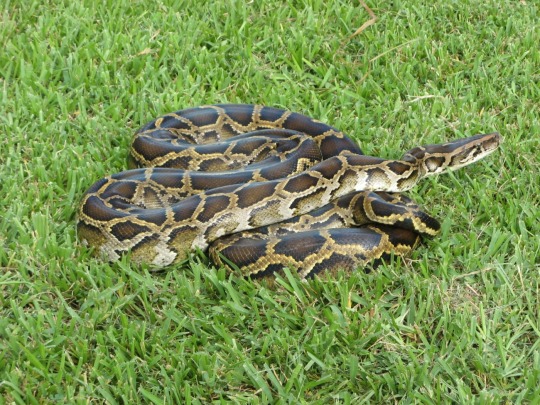
Scientists develop groundbreaking method for detecting DNA of invasive snakes in Florida
Scientists at the University of Florida have developed a pioneering tool to bolster Florida's defenses against invasive species: a DNA-based environmental monitoring test that can pinpoint where they've been, aiding eradication efforts.
Once a nonnative species gets into an environment, it is often too late to get rid of it, and the focus shifts to containment or long-term management. Both approaches come with heavy costs concerning native wildlife and funding, explained Melissa Miller, lead author on the study and an invasion ecologist at the UF/IFAS Fort Lauderdale Research and Education Center (UF/IFAS FLREC). "We hope this novel eDNA sampling tool we have designed will help increase efficiency in invasive species management, allowing for early detection and rapid removal of nonnative species," she said...
Read more:
https://www.sciencedaily.com/releases/2024/11/241122130344.htm
#invasive species#herpetology#florida#animals#nature#science#eDNA#DNA#environment#conservation#snake#reptile
202 notes
·
View notes
Text
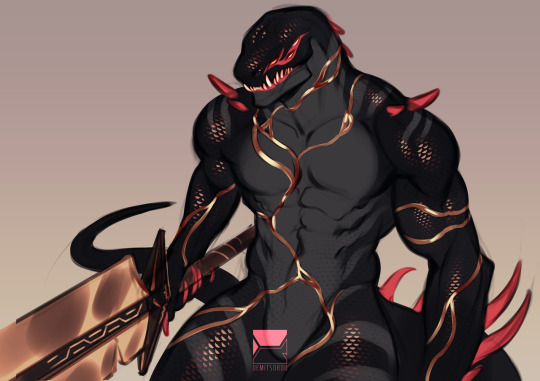

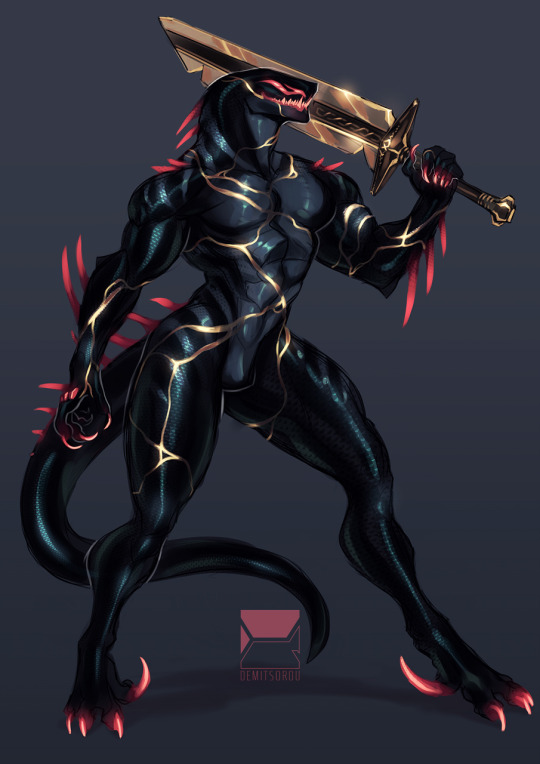
My thrall Saros, he's a giant 14ft tall biopunk lizard demon that can shift form between the said giant lizard and a fucked up monster man with fat tits. Artworks from 2019/2020
Thralls and The Loyal Ones Fantasy Universe belong to @sixfootart
#monster#terato#scalie#reptile#lizard#biopunk#thrall#the loyal ones#tlo saros#demi-oc-art#demitsorou-art#closed species
1K notes
·
View notes
Note
Hi I was wondering what u think a female night fury be like ? Do you think like most birds they’re bigger than the males or have you got something else in mind ? Love to hear your thoughts ^^

Personally my take on the female night fury is that it is bigger than the male, with a few minor differences with ear nubs/leg spikes and stuff. I’m mainly basing that off reptiles where a lot of the time the female is bigger, but other than that there isn’t much in terms of sexual dimorphism. That being said there are a lot of examples of male reptiles being bigger than the female of the same species, but eh, it’s a fictional flying lizard, who cares.
#If we were gonna go with what is most likely to appear in canon if they did ever introduce a female night fury#then it would probably just be toothless with a different face#like no dimorphism#cuz as much as them weirdos like their feminine reptiles#they would get bad media coverage#at least with the light fury they could excuse it as being a sub species#even though it looks like a tampon😭#httyd#how to train your dragon#my artwork#art stuff#artist#original art#my art#digital art#art#dragons#night fury#night furies
205 notes
·
View notes
Text
28th of October 2024: Alligator Snapping Turtle
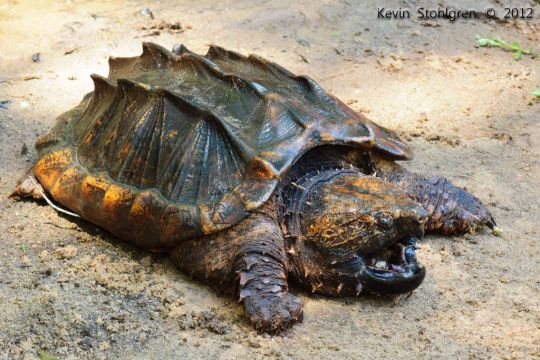
Let’s just keep the ridiculously large critters rolling for our Halloween season; here’s the Alligator Snapping Turtle (Macrochelys temminckii). They are the largest freshwater turtle in the USA [1], at a length of 40-70 cm and weight of 18-70 kg [2].
They are found mostly in the Southern parts of the United States [1], where they will prefer to stay in the parts of the waterways that offer cover to them, such as submerged logs, overhanging shrubbery, or beaver dams. They don’t leave the water, except to lay eggs, and so they also don’t spend time basking in the sun. Instead it is suspected that they use different water depths to adjust their temperature as the seasons change [3].
They are opportunistic generalist predators, being open to eating most things that come swimming their way [4]. That’s not even a metaphor, as their hunting strategy involves opening their mouth to reveal a worm-like appendage that their prey mistakes for food when the Alligator Snapping Turtle lies still. Thus they come closer and the turtle will eat them [2]. This obviously leads to a lot of fish in their diet, as well as crawfish and freshwater mussels, however researchers have also found remains of other turtles, mammals such as nutria, snakes, or even birds within their stomachs [4].
While they’re native to the USA, they have also been introduced to and are now considered an invasive species in South Africa [2]. In the 1960s and 1970s they were also threatened by commercial hunting, and while it’s been banned since, there are still people who illegal hunt them. They are also affected by the killing of other non-human animals by humans, as they may swallow hooks or become entangled in fishing lines [1]. They are rated as Vulnerable by the IUCN, but that assessment was made in 1996 and has not been updated since [5].
Sources: [1] [2] [3] [4] [5] [Image]
#critter of the day#critteroftheday#halloween critters#reptile#turtle#snapping turtle#reptile species#reptile facts#zoology#animal species#herpetology#animal#animal facts#turtle facts#turtle species#aquatic species
2 notes
·
View notes
Text




Three-toed box turtle 》 Terrapene triunguis
Sometimes if I go early enough I can say good morning to some box turtles in the park.
Southeast Texas, 12 July 2024
#not a mushroom#not fungi#turtle#box turtle#wild turtle#wildlife#wildlife of Texas#species identification#reptile#reptile species#reptile identification#amatuer mycology#mushrooms#mushroom hunting#mycology#fungi#mushrooms of texas#texas mushrooms#wild fungi#fungi of texas#special interest#goblincore#bogcore
5 notes
·
View notes
Text

In the river bed, acrylics on canvas
171 notes
·
View notes
Text
Island ecosystems are always more vulnerable than those on larger continents. Less space means fewer resources, which leads to each species having a smaller population. For endemic species that can't fly or otherwise get to another island or mainland, once that one island's ecology is disrupted significantly enough, the risk of extinction becomes very real.
Sombrero Island is no exception, having been completely deforested and torn up for mining. Invasive mice put further pressure on native species. With the mice eradicated, native plants can once again thrive, and the Sombrero ground lizard is less likely to see its eggs or young eaten by hungry mice, and its population has risen from fewer than 100 individuals in 2018 to over 1600 today.
This is yet another example where removing invasive species and restoring habitat with and for native ones can help an ecosystem and its inhabitants recover. The more biodiversity we preserve on our planet, even in these seemingly tiny, isolated places, the better equipped all of us will be to weather the years to come.
#biodiversity#endangered species#extinction#lizards#herps#reptiles#herpetology#habitat restoration#animals#wildlife#nature#ecology#restoration ecology#environment#conservation#wildlife conservation
276 notes
·
View notes
Text

Submitted for classification by @iamshmolphrog
"How bout this polite turtle"
78 notes
·
View notes